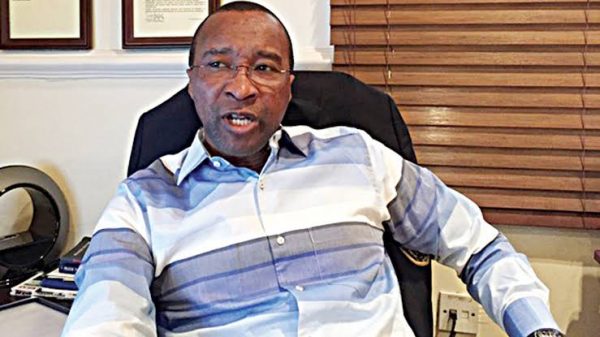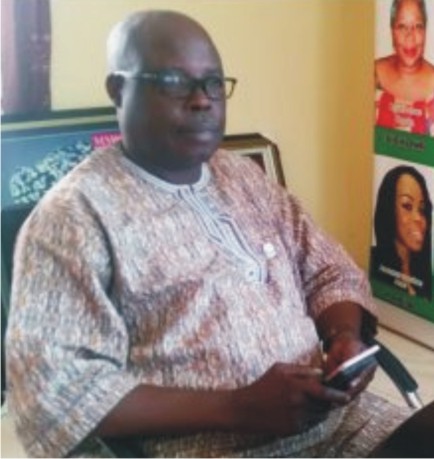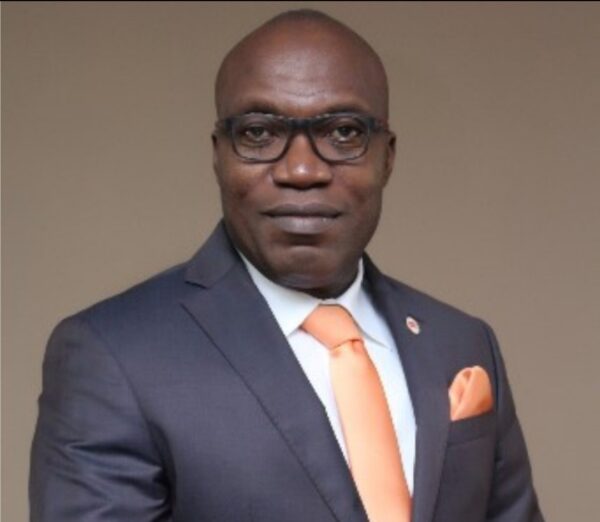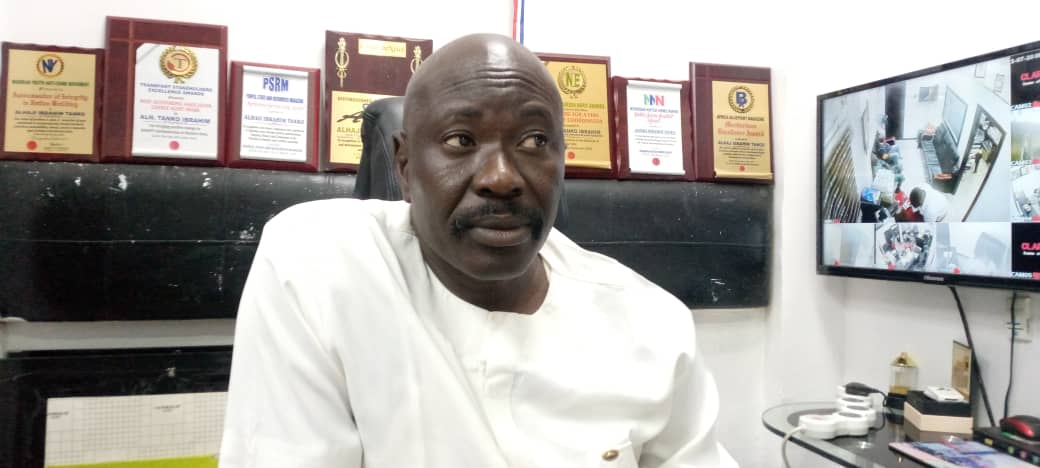How FG Can Address Hostility Towards Airport Concession – Iyayi

By Kenneth Jukpor
Mr. Roland Iyayi is the Chief Executive Officer of Top Brass Aviation Limited. He is also a former Director-General of the Nigerian Airspace Management Agency (NAMA). In this exclusive interview with MMS Plus newspaper, he shares thoughts on several salient issues in the nation’s aviation sector. Iyayi expounds the issues responsible for the resentment towards airports concession, proffers veteran approach and itemizes possible economic challenges. He also rates the nation’s aviation sector as Nigeria celebrates 60 years of independence.
Enjoy it:
Recently, there have been agitations among the aviation unions and other stakeholders over the proposed concession of four major airports in the country, what is your view on this?
The controversy lingers because the federal government through the Ministry of Aviation hasn’t represented itself well, in the sense that they have not been able to clearly tell the stakeholders what their actual plan will be. As long as people believe there is a perceived intent or purpose which is not considered to achieve collective good in the sector, it would be very difficult to get support. I think the government should have started by making everybody understand what they want to do. The structure of what they’re trying to do and how they intend to do it should also be transparent. These are the things operators and other stakeholders expected to have be in the public space and it will give everybody the opportunity to clearly establish the intent of the government. It is very clear that there is paucity of funds and the government cannot continue to fund airports development. This is something we’ve talked about throughout the last decade.
Now that they’re ready to take on this challenge, the best way to do it is to engage the stakeholders to show them the intent and clarify that the objective is the public good. Once that is established, they would get support which is required to drive the business.
What are the possible challenges that could emerge if the concession goes ahead without the endorsement of aviation stakeholders?
If this industry-wide support isn’t available, no matter how well the intention or objective is; it’s going to be very difficult to carry it out. The unions are already saying that they do not believe that their interests have been taken care of, as they consider the possibility of job losses. These are things that require robust engagement.
The government would have been able to address these by letting them understand that there might be threat to job losses, but display the benefits of the concession. This approach will allay the fears of the unions and get their support.
There’s absolutely no way the federal government will move with this project without getting the support of the unions. I mean it’s very difficult when it is a democratic dispensation, you can’t just throw things at people by fiat. If the people do not support you, when you’re out of government, the same people can bring the agreement down.
We saw what happened with Virgin Nigeria. Virgin Nigeria had good intentions and the government supported it but some industry stakeholders were not carried along. At some point the government left office and some individuals got together and said the few privileges given to Virgin Nigeria was making other airlines operate at a disadvantage, consequently, they removed it.
The agreements signed with Virgin Atlantic had privileges enshrined in it. Once that agreement was breached by removing that proviso, Virgin Atlantic pulled out. So, these are things that we should learn from and I don’t think we have learned from our past mistakes in the aviation sector. That is why as a stakeholder and operator, I insist that it is important to get the support of all industry players.
For the sake of airlines, we don’t want a situation where we concession the airports and set up cartels. When you set up cartels, you end up with a situation where the airlines are made to pay punitive charges at the new airport terminals. We understand from what the Minister of Aviation, Senator Hadi Sirika has said, that the concession is in the terminals not the entire airports. The concessionaires could decide to introduce new charges that make it difficult for the airlines to be competitive. I’m not sure the government has taken this into cognizance but this is a genuine concern for airlines.
If you do not get the airlines to agree with you that what you’re doing is right; you can decide to make your move. But you must understand that the airports or terminals will be used by the airlines. If the airlines come together even when you are no longer there and decide that whatever you put in place for them isn’t beneficial or it’s disadvantageous, it would eventually be reversed.
The Nigerian government also wouldn’t want a situation where the country is laughed at in the international community because of lack of proper engagement. If we don’t do it right the intentional community can also intervene and this is a huge mess. It is important that top issues like this are properly deliberately before carried out. The level of engagement on this issue is not as robust as it should have been. Nevertheless, I don’t think it’s too late to engage stakeholders. The government needs to be more open and get everybody to believe the objective is for the benefit of the industry rather than few individuals like it’s been posited by the unions.
How relevant is the capacity and integrity of the would-be concessionaires to the success of the airport concession?
We know that there are few reputable world renowned airport operators and some of them are very good when it comes to airport terminal management. So, if Nigeria is bringing in concessionaires who are not one of these well-known reputable organizations worldwide, then the government is leaving even more room for doubt as to the genuineness or otherwise, of what they intend to achieve.
The government should actually go out there and shop for people who believe in our market, who are actually world renowned for what it is we’re proposing because bringing in people who do not have the experience or the expertise to manage terminals can actually lead to a more chaotic regime than we already have in the country. We might be better-off staying with what we know and manage that for now, than getting into a more chaotic situation than we already have.
These are key issues in terms of looking at the concession from the perspective of the aviation stakeholders as well as the side of government. Obviously, the primary objective is to manage the paucity of funds but I expect the government to bring onboard people with expertise and the level of funding to be able to create the value we expect.
Also, if the government clearly defines its objectives, different stakeholders can see where they fit in and make appreciable contributions.
Nigerian seaports terminals were concessioned without an economic regulator. At the airport, the Nigeria Civil Aviation Authority (NCAA) plays the role of economic regulator but it also has other functions; should the airports concession proceed without a distinct economic regulator for the aviation sector? Profit driven investors will be keen to increase charges, should the industry prepare for the influx of arbitrary charges?
The truth is that the NCAA is charged with both safety and security oversight functions and also the economic regulatory oversight functions. What that means essentially is that service providers in the industry including airlines, air navigation service providers like the NAMA, the Federal Airports Authority of Nigeria (FAAN), and Nigerian Meteorological Agency (NIMET), all these service providers are bound by the regulations of the NCAA.
The unfortunate thing is that over the years NCAA hasn’t necessarily wielded its powers in certain areas, especially the aspect of economic regulation. This has given people the impression that they don’t have those powers, indeed they do.
There’s a provision in the NCAA Act that says that before any service provider can increase its charges there should be stakeholder consultation. NCAA is required to broker this and ensure that all parties concerned have been heard with their views taken onboard. The NCAA should also check to see whether there is a justification for such an increase as being proposed by whoever that service provider is.
A classic example is the recent increase in the passenger service charge (PSC) by FAAN from N1000 to N2000 which they’re actually talking about taking effect soon. Now, that essentially required that a stakeholder consultation be held, but FAAN will say that they had a zoom meeting for all stakeholders, during which this discussion held and the NCAA was represented. I can guarantee you that this was done as a fulfillment of that provision in the NCAA regulation. Whether the views of the stakeholders were carried or taken onboard before the decision was reached, is another matter entirely.
There has been some justification for this increment by FAAN as they argued that Murtala Mohammed International Airport Local Wing 2 (MM2) is charging N2000 already and people are paying. It’s true that people are paying, but can you compare the level of service received at MM2 to the FAAN terminals? That is one of the questions that people will ask. If you cannot compare the services, then obviously you cannot justify the increase.
Another argument could be that FAAN has not increased the charge for several years despite the price escalation in the last decade; this could be a justification for the increase. Nevertheless, is this a justification for 100% increase? I’m not sure that is a good way to go because what is not understood is the economic fact that when you increase the price of a commodity by X factor there’s a commensurate suppression of demand.
Airlines are usually the recipients of the increment in charges in the aviation sector. The airlines by design for their services are required to provide capacity, which is aircraft that they provide and if anything happens outside of their control it is something that still comes back to hit them. The increments we’re talking about is something that the airlines cannot control. What would happen ultimately is that when you increase the cost of the ticket by another N1000, whether or not we acknowledge it, we are commensurately reducing the demand of the airline services. When the demand is reduced, it means that the airlines that are already struggling to break even are going to have a more difficult situation to survive. The number of passengers they’re carrying would reduce commensurately. It may not be seen because we’re talking about N1000 increase in ticket will reduce the demand by maybe another 5 percent or something like that. Work out what 5 percent is in the current numbers of airlines’ passengers and you would observe that the airlines are going to struggle more to break even with COVID-19 pandemic and consequent challenges.
As Nigeria marks 60 years of independence, how would you rate the journey so far based on the aviation point of view?
I don’t think Nigeria has done well in the aviation sector. In the last two decades we’ve seen more failures than successes. I believe there’s room for even more growth and successes. However, it comes back to the way the operating environment is managed.
We need to have people who truly understand the impact of their policies or actions on the entire industry. It’s not good enough to just say you’re going to put a policy in place. Has there been a cost benefit analysis of that policy to see how it best serves the industry? Have consultations been taken onboard?
These are critical things; unfortunately we have not had that benefit in the industry in Nigeria. Things have mostly been done in the sector based on knee jerk reactions. There is a need to look at issues thoroughly to know the impact in the long term even though they can have short term benefits. When you look at the medium and long term effect, it might be a very bad idea. So, the industry should not implement policies to address current situations without taking cognizance of the future.
Sometimes, you see that the industry records certain successes but we’ll come up with a policy that erodes such successes completely and we start having failures. It is important to have people who understand the impact of what they’re doing on the industry. It’s also important to have consistent policies.
There are lots of issues affecting the aviation industry. These issues are very multifaceted and intertwined. We need to understand that anything done in one part of the sector affects some other part. After realizing this, industry stakeholders must collaborate and compliment each other’s efforts for the industry to make significant progress.







